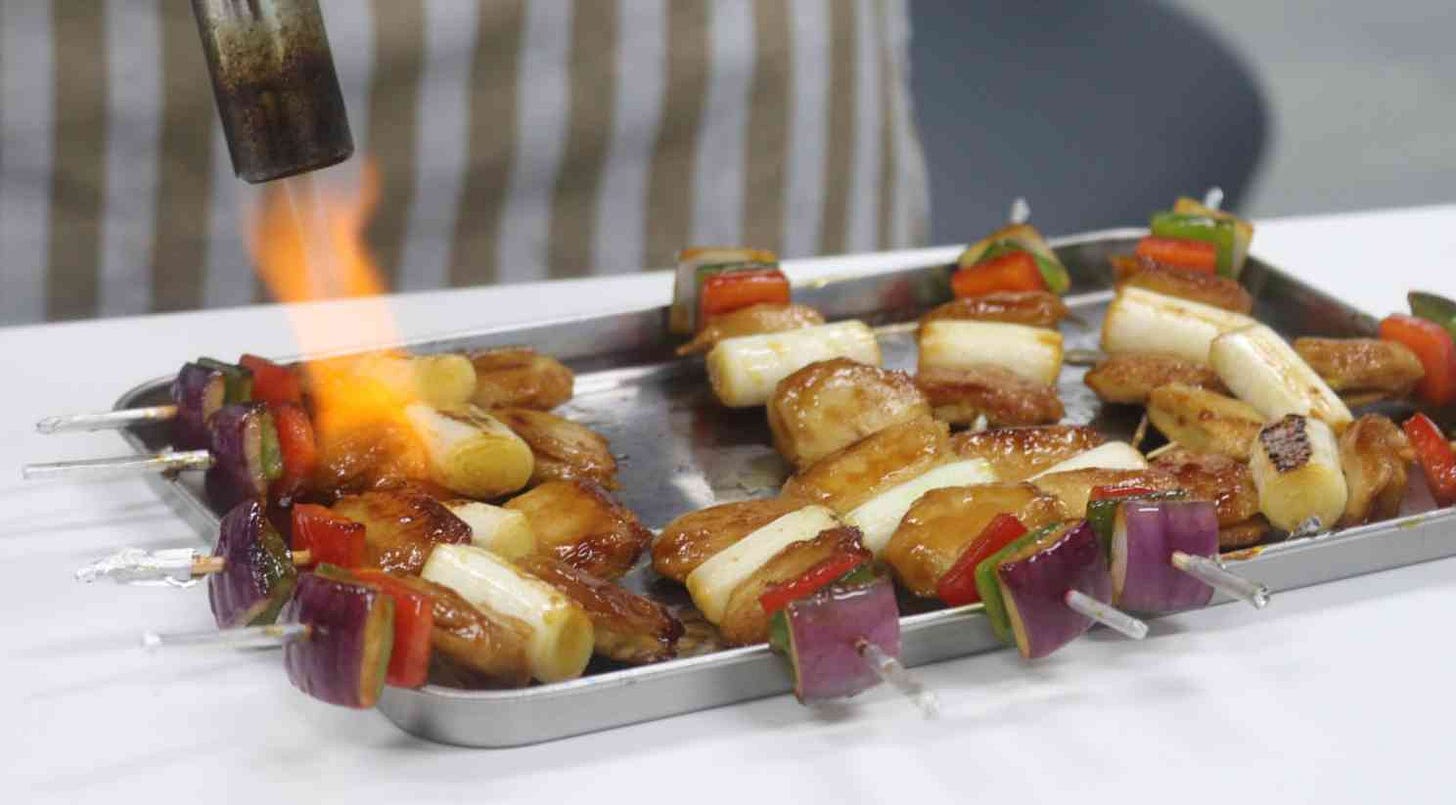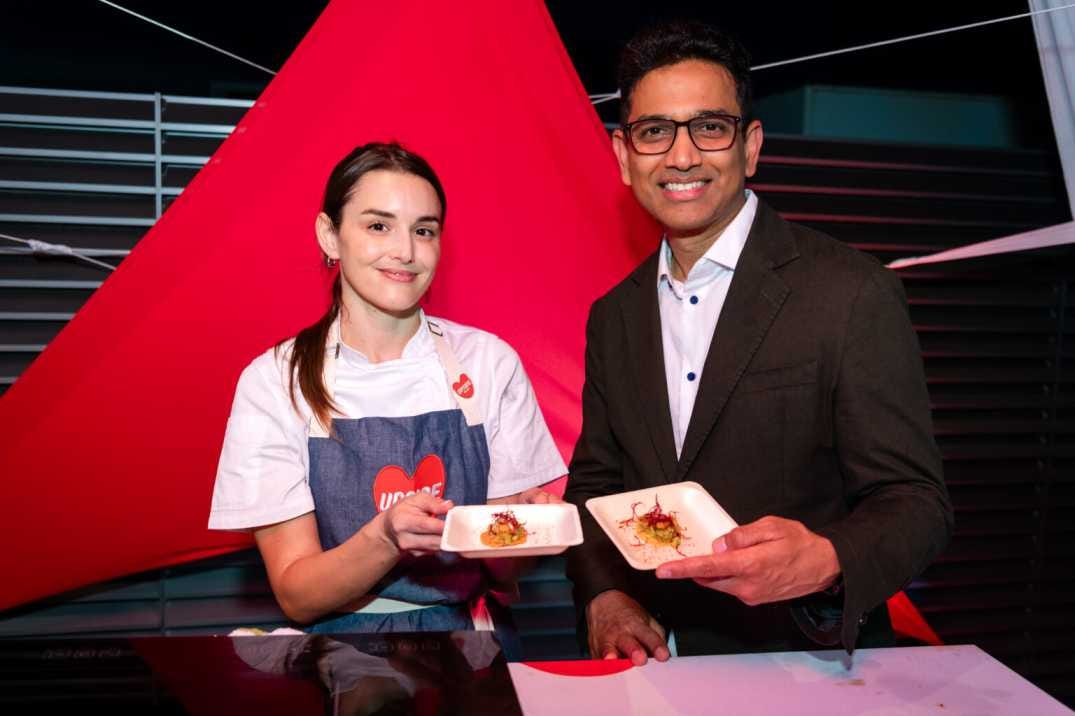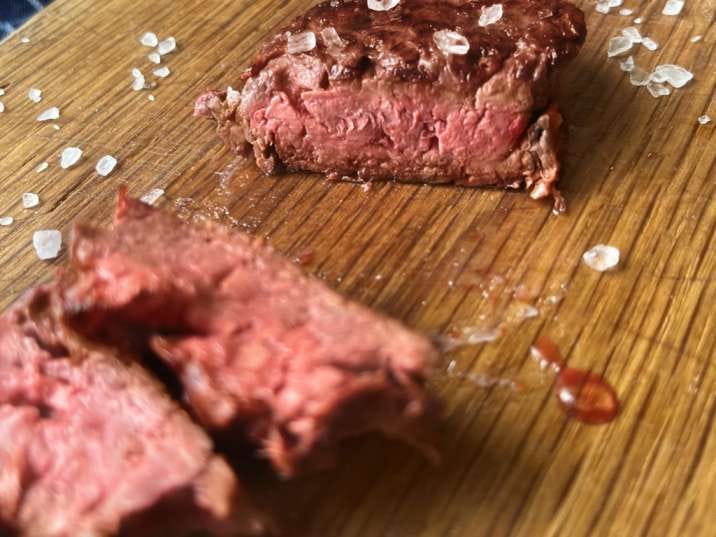Cultivated Fat Breakthroughs, Space Food Innovations, and China's Biomanufacturing Appetite
Also: Switching 50% of the US protein supply to alt proteins could free up land the size of South Dakota
Hi, welcome to issue #70 of the Better Bioeconomy newsletter. Thanks for being here!
Here’s my favourite quote that I came across while working on this week’s issue:
"We don't really know the truth, the whole scientific method is a way for us to slowly uncover the truth. That's the part that's exciting. Science is not this thing that you're reading in a textbook. Science is this thing that we are all co-creating.”
- Deniz Kent, co-founder of Prolific Machines
Let’s dig into the latest developments in biotech, shaping the future of food! 🍽
BIO BUZZ
🐷 Ants Innovate introduced a cultivated pork ingredient in hybrid meat dishes at a private tasting in Singapore
During the tasting event, the Singaporean startup introduced Cell Essence, a cultivated pork oil used in hybrid meat (a mix of cultivated meat cells and plant-based ingredients) dishes.
The cultivated pork oil was featured in three dishes: IKEA-style meatballs, Shanghai-style soup dumplings (xiaolongbao), and teriyaki grilled skewers. Each dish highlighted Cell Essence's versatility and flavour-enhancing properties.
The company uses Scalable Micro-Imprinted Lapis Expansion (SMILE) technology to create functional hybrid meat ingredients that enhance taste, texture, and affordability.
“The small percentage of cells (<3%) was enough to deliver on the sweet, salty and umami flavour that conventional pork has.” - Calisa Lim, senior project manager at APAC-SCA
Source: Green Queen
🤝 Fonterra signed a multi-year agreement with Superbrewed Food to explore the potential of Superbrewed's postbiotic ingredient
The collaboration also explores the use of lactose permeate—a byproduct of Fonterra's milk protein production—as a feedstock for Superbrewed's microorganisms, promoting a circular solution.
Superbrewed Food's postbiotic ingredient is derived from non-GMO bacterial biomass. It contains 85% protein with a high PDCAAS of 0.91, surpassing most plant-based proteins. It's also rich in B vitamins, iron, and zinc, with a neutral taste, white colour, and high stability, making it ideal for various food applications.
Superbrewed Food collaborates with major industry players, distributors, and smaller companies across various sectors, including shelf-stable snacks, sports nutrition, and dairy alternatives. The first products containing their postbiotic ingredient are expected to launch in Q1 2025.
Source: AgFunder
🏆 Solar Foods won the international category of NASA and CSA's Deep Space Food Challenge
The competition aims to develop innovative food solutions for astronauts on long space missions. This victory marks Solar Foods’ success across all three phases of the challenge.
The Deep Space Food Challenge emphasized the need for sustainable, nutritious food production methods in space, where resources are limited. Solar Foods' Solein, a protein made from air and electricity, was noted as a leading solution due to its adaptability to space conditions.
"Our mission is to solve the global food crisis and of course, Solein is primarily meant to be enjoyed on Earth. But Space is the ultimate stress test of a circular economy: It represents both an opportunity to advance the history of science and a chance to grow and diversify our business”, said Solar Foods’ Arttu Luukanen.
Source: Solar Foods
🛠 Mission Barns engineered a novel adherent bioreactor system designed to improve cultivated fat cells' production efficiency
The new system allows for high cell density and efficient mass transfer, unlike traditional single-cell suspension bioreactors, which face difficulty with fat cells due to issues like cell buoyancy and nutrient distribution.
By focusing on fat instead of muscle, Mission Barns reduces production costs. Fat cells mainly need glucose, lowering media costs to single-digit dollars per liter. These cells also have lower oxygen demand and don't require complex muscle formation, making the process simpler and more cost-effective.
Mission Barns has conducted over 100 successful bioreactor runs in its pilot facility. To validate its technology, the company plans to launch products in select outlets next year, pending regulatory approval.
Source: AgFunder
❌ Upside Foods is suing Florida over a ban on cultivated meat, calling the legislation unconstitutional
The California-based cultivated meat leader has filed a lawsuit against Florida, challenging the state's recent ban on producing and selling cultivated meat.
The ban, announced on May 1 by Governor Ron DeSantis, classifies the production and sale of cultivated meat as a second-degree misdemeanour. Penalties include fines up to $5,000, up to 60 days in jail, and the revocation of business licenses.
Upside Foods, supported by the Institute for Justice, claims the ban violates the Commerce Clause and the Supremacy Clause of the U.S. Constitution. They argue that the law was driven by economic protectionism favouring traditional cattle interests and lacking a legitimate public health basis.
Source: Green Queen
👽 How Pioneer Labs is making microbes ready for Mars
The first step involves engineering E. coli and B. subtilis microbes to thrive in Mars-like environments, particularly on Martian regolith, which contains valuable nitrogen and high levels of toxic salts and perchlorates.
The team is using a cyclical process of setting benchmarks, measuring strain performance, and engineering microbes through functional genomics and directed evolution to develop strains that can withstand these harsh conditions.
The first major initiative is to develop the "Indoor 0.0 Benchmark" to test and improve microbial tolerance to salt and perchlorate in indoor Martian biomanufacturing settings. Additionally, efforts are focused on optimizing assays and transferring extremophile properties to more commonly used microbes.
Source: Pioneer Labs
MACRO STUFF
🇨🇳 China's growing interest in fermentation and cultivated proteins over plant-based meat
China's alt protein market started in 2019 and has evolved from an early focus on plant-based meats to a growing interest in fermentation and cultivated meat, driven by unmet consumer expectations and national strategies.
The national 'Five-Year Plan' highlighted biomanufacturing as a key driver for alt protein development. It aims to establish China as a global biomanufacturing hub despite current scaling and cost challenges.
Health-focused consumer trends in China are driving the inclusion of value-adding ingredients like Human Milk Oligosaccharides (HMOs), with upcoming opportunities for fermentation-based products in the market.
Source: Swissnex in China
🇺🇸 If Americans switched 50% of their meat, dairy and egg intake to alt proteins, the country would free up land nearly the size of South Dakota
More specifically, this switch could free up 47.3 million acres of cropland, 32 million acres of forage, and 31.5 million acres of feed crops.
This dietary shift could restore 64% of the US's 485 vulnerable or endangered ecosystems, aligning with the National Climate Task Force’s goal of conserving 30% of national land and waters by 2030.
Restoring natural areas from this land could sequester 178 million tonnes of CO2e annually, equivalent to more than all domestic flight emissions in the US in 2021, boosting the national carbon sink by 22%.
Source: Green Queen
🇬🇧🇮🇱 The UK and Israel launched a collaborative research program providing early-stage grants for research projects, including alt proteins
The UK Department for Science, Innovation, and Technology (DSIT) and Israel's Ministry of Innovation, Science, and Technology (MOST) teamed up to create the UK/Israel Research Collaboration, which focuses on advancing science and innovation between the two countries.
The program will support early-stage research in areas like food tech, quantum technologies, and AI in drug discovery. It offers grants of up to £200,000 for collaborative research projects.
The initiative seeks proposals aligned with two key themes: 'Transformative Technologies,' which focuses on responsible technological developments in previously mentioned areas, and 'Tomorrow’s Talent,' which supports the development of the next generation of researchers.
Source: The Cell Base
BIO BUCKS
🇦🇺 Cauldron secured AUD 4.3M from the Australian government's Industry Growth Program to scale its precision fermentation platform
The Australian startup has developed a continuous 'hyper' fermentation process that is more efficient and commercially viable compared to traditional batch methods.
Cauldron successfully ran a 10,000-liter production system for over eight months without contamination or genetic drift, overcoming two key challenges in long-term fermentation. The continuous process lowers both variable and fixed costs, which allows for more cost-effective production of high-value ingredients.
The startup recently appointed biotech industry veteran (Solugen, BASF, Verenium Corp) Dr. David Weiner as CTO.
Source: AgFunder
🥩 Adamo Foods raised $2.5M in seed funding to scale up production of its mycelium-based steak
Alongside its fungi-based steak, which is claimed to be the first ultra-realistic beef steak alternative made from mycelium, the UK-based startup is also developing a chicken breast alternative.
The company aims to disrupt the whole-cut meat alternatives market, which has traditionally been challenging due to the difficulty in replicating the texture and structure of meat.
Adamo’s clean-label mycelium steak is made from just five natural ingredients, without artificial binders, and offers high protein, fibre, and no cholesterol.
Source: vegconomist
SOUND BITES
💡 Deniz Kent, co-founder of Prolific Machines, on using light to control cellular processes for efficient biomanufacturing
💨 Nick Hazell, founder of Algenie, on the potential of algae as a carbon capture solution and cost reduction breakthroughs
See disclaimer below1
APAC AGRI-FOOD INNOVATION SUMMIT
🤝 Meet 1000+ global leaders who are accelerating climate-adaptation strategies for food security in Asia
Better Bioeconomy is excited to be a media partner for the Asia-Pacific Agri-Food Innovation Summit, taking place at Marina Bay Sands on November 19-21!
As the anchor event of Singapore International Agri-Food Week (SIAW), in collaboration with Temasek, the Singapore Food Agency (SFA), and Enterprise Singapore (ESG), the Asia-Pacific Agri-Food Innovation Summit will bring together over 1000 global leaders to identify the strategic priorities as we build greater capacity, security, and resilience in Asia’s agri-food system.
🙌🏾 Use my discount code ‘BIO10’ to save 10% – offer ends Thursday, August 29.
MORE ON BETTER BIOECONOMY
💬 My conversations with bioeconomy innovators
Biotech consultant and ex-CSO of Vow, James Ryall: Bridging Science and Business to Support Startups Using Biomanufacturing
Synonym's co-founder, Joshua Lachter: Financing and Developing Infrastructure for the Bioeconomy
Bioshyft's founder, Gerrit Feuerriegel: Connecting Innovators, Investors, and Incumbents to Drive the Bioeconomy
Terra Bioindustries’s CMO, Rebecca Palmer: Turning Agrifood Byproducts Into Nutrient-Rich B2B Ingredients
That’s a wrap. Thank you for taking the time to read this issue!
Are you new here?
Know anyone else who would dig this newsletter?
Disclaimer: Simon Newstead, the podcast host, is a General Partner at Better Bite Ventures, where I work.






